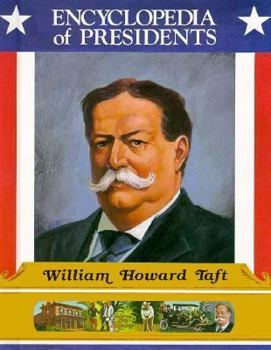William Howard Taft: Twenty-Seventh President of the United States
Select Format
Select Condition 
Book Overview
Examines the life and career of the lawyer whose relatively unsuccessful presidency was followed by a happy term as Chief Justice of the Supreme Court. This description may be from another edition of this product.
Format:Hardcover
Language:English
ISBN:0516013661
ISBN13:9780516013664
Release Date:January 1989
Publisher:Children's Press(CT)
Length:98 Pages
Weight:0.10 lbs.
Dimensions:0.6" x 7.3" x 9.3"
Age Range:10 to 13 years
Grade Range:Grades 5 to 8
Customer Reviews
1 rating
A deservedly sympathetic juvenile biography of Taft
Published by Thriftbooks.com User , 21 years ago
The story of William Howard Taft is one of the strangest for any President of the United States as this volume from the 1989 edition of the Encyclopedia of Presidents series clearly proves. Jane Clark Casey begins this juvenile biography of the 27th President as is always the case in this series, in media res, focusing on Taft's unsuccessful bid for re-election in 1912. Having been Theodore Roosevelt's handpicked successor four years earlier, T.R. had denounced Taft and started the Progressive ("Bull Moose") party to make another bid for the White House. The net effect was to split the Republican vote and while T.R. finished second to Woodrow Wilson, the highest finish by a third party candidate, Taft received less votes than any incumbent President in history. On the very first page of this book Casey tells of a reporter finding Taft weeping because he had finally responded to the attacks from the man who had been his closest friend. Yet while this juvenile biography begins with Taft at the lowest point in his life the volume ends with Taft fulfilling a lifelong dream. Consequently, young readers will find this one of the most interesting and even inspiring presidential biographies.Having established the idea of Taft as a reluctant warrior, Casey goes back to the beginning to tell the story of a promising young man from a wealthy Cincinnati family, After graduating from Yale Law School Taft entered on a life of public service that established a reputation for efficiency and honesty. First and foremost, Taft loved the law; he was the youngest federal circuit court judge in history and was considered a prime candidate for the Supreme Court. However, Taft's judicial career was sidetracked by various administrative assignments, including being governor of the Philippines and Secretary of War. It was as the later that he impressed Theodore Roosevelt enough to be offered the Republican nomination. Ironically, given Taft was an unsuccessful one-term President, Casey devotes more attention to his bitter years in the White House than many companion volumes in this series to for more prominent presidents. Clearly, she is making the case for Taft's reputation against the charges T.R. would levy when they split in 1912. She contrasts Taft as "A Fish Out of Water," who was never comfortable being the chief executive," with the idea that Taft was either too committed or simply too naïve to stay out of controversial political battles, detailed in the chapter "Where Angels Dare Not Tread." However, it was the Ballinger-Pinchot Affair that would cause T.R. to come out of retirement and change the course of American political history (just think about what happens to American neutrality if when World War I breaks out the President is Taft, the former governor of the Philippines, instead of Wilson, the college professor from Princeton). Casey makes it very clear that Taft did the best to make a bad situation better and that it was T.R. who was unre





